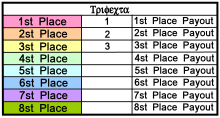
A trifecta is a parimutuel bet placed on a horse race in which the bettor must predict which horses will finish first, second, and third, in the exact order. Known as a trifecta in the US and Australia, this is known as a tricast in the UK, a tierce in Hong Kong, a triactor in Canada and a tiercé in France. A trio, offered in Hong Kong and France, is a variation in which the order of the horses is not relevant.
Variations
Boxed
A "boxed" trifecta is where three horses are selected, and the player wins if these three horses finish first in any order. Boxed bets are effectively equivalent to placing standard trifecta bets on all six possible outcomes of the selected horses. For example, a boxed trifecta of horses numbered 6, 7 and 9, wins if horses finish in any of these combinations of outcomes:
- 6, 7, 9
- 6, 9, 7
- 7, 6, 9
- 7, 9, 6
- 9, 6, 7
- 9, 7, 6.
Banker
One horse (the "banker") is chosen to win the race, and two or more selections are boxed to come second and third. The "banker" must win in all possible combinations. For example, if horse number 2 is the banker, and the other three choices are numbered 6, 7 and 8, then there are a total six possible combinations for a winning bet:
- 2, 6, 7
- 2, 6, 8
- 2, 7, 6
- 2, 7, 8
- 2, 8, 6
- 2, 8, 7.
Roving banker or banker multiple
One horse (the "banker") is chosen to finish in the first three, and three or more selections are boxed for the other two places – the banker must finish either 1st, 2nd or 3rd in each possible combination. For example, if horse number 6 is the banker, and horses number 7, 8 and 9 are the selections, then there are total of eighteen combinations for a winning bet, each with horse number 6 in them, for example:
- 6, 7, 8
- 7, 6, 8
- 7, 8, 6
- 6, 8, 9
- 8, 9, 6, and so on.
History
The term was first used in the 1970s, and was derived from perfecta (a bet on which horses will finish first and second) and tri- (three).
In the United States, the trifecta was introduced at Arlington Park in 1971. It was first used in Australia in April 1977 by TAB New South Wales, and was introduced in New Zealand in December 1983.
See also
References
- ^ "Trifectas". The Blood-Horse authoritative guide to betting thoroughbreds (1st ed.). Lexington, Kentucky: Eclipse Press. 2005. pp. 39–41. ISBN 9781581501193.
- "Horse Betting Types". BN.eu.
- "Forecast & Tricast Bets – Help". SkyBet.com. Retrieved October 20, 2013.
- ^ "Pari-Mutuel Pools – Beginners guide". special.hkjc.com. The Hong Kong Jockey Club. Retrieved March 6, 2018.
- "Horse Racing Terms & Glossary". All Horse Racing. 2018. Retrieved March 5, 2018.
- "PMU betting guide in English". PMU.fr. PMU International. Retrieved March 6, 2018.
- "Guide des Paris". eurotierce.be. Eurotiercé. Retrieved March 6, 2018.
- "FB88". Saturday, 5 June 2021
- ^ Garner, Bryan A. (2009). "Trifecta". Garner's modern American usage (3rd ed.). New York: Oxford University Press. p. 823. ISBN 9780195382754.
- Room, Adrian (2010). "Trifecta". Dictionary of Sports and Games Terminology. Jefferson: McFarland & Co., Publishers. p. 163. ISBN 9780786457571.
- Thompson, William N. (2001). "Horse racing. Tracks and track organizations". Gambling in America : an encyclopedia of history, issues, and society. Santa Barbara, California: ABC-CLIO. p. 182. ISBN 9781576071595.
- Grant, David (2000). "Chapter 10: The TAB and bet types". Two over three on goodtime sugar; The New Zealand TAB turns 50. Wellington: Victoria University Press. p. 213. ISBN 9780864734013.